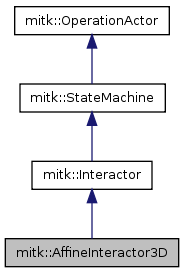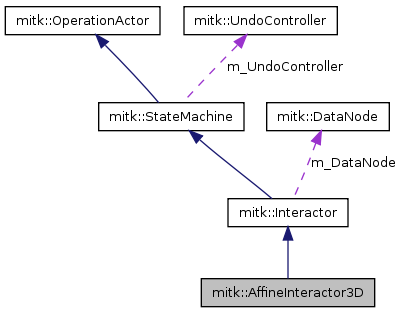Affine interaction with objects in 3D windows. More...
#include <mitkAffineInteractor3D.h>


Public Types | |
| enum | { INTERACTION_MODE_TRANSLATION, INTERACTION_MODE_ROTATION } |
| typedef AffineInteractor3D | Self |
| typedef Interactor | Superclass |
| typedef itk::SmartPointer< Self > | Pointer |
| typedef itk::SmartPointer < const Self > | ConstPointer |
Public Member Functions | |
| virtual const char * | GetClassName () const |
| void | SetInteractionMode (unsigned int interactionMode) |
| void | SetInteractionModeToTranslation () |
| void | SetInteractionModeToRotation () |
| unsigned int | GetInteractionMode () const |
| void | SetPrecision (ScalarType precision) |
| Sets the amount of precision. | |
| virtual float | CanHandleEvent (StateEvent const *stateEvent) const |
| calculates how good the data, this statemachine handles, is hit by the event. | |
Static Public Member Functions | |
| static Pointer | New (const char *_arga, DataNode *_argb, int _argc) |
| static Pointer | New (const char *_arga, DataNode *_argb) |
| NewMacro with two parameters for calling itk::Lightobject::New(..) method. | |
Protected Member Functions | |
| AffineInteractor3D (const char *type, DataNode *dataNode, int n=-1) | |
| Constructor with Param n for limited Set of Points. | |
| virtual | ~AffineInteractor3D () |
| Default Destructor. | |
| virtual bool | ExecuteAction (Action *action, mitk::StateEvent const *stateEvent) |
| Method called in HandleEvent after Statechange. | |
| bool | ColorizeSurface (vtkPolyData *polyData, const Point3D &pickedPoint, double scalar=0.0) |
Affine interaction with objects in 3D windows.
NOTE: The interaction mechanism is similar to that of vtkPlaneWidget
Definition at line 42 of file mitkAffineInteractor3D.h.
| typedef itk::SmartPointer<const Self> mitk::AffineInteractor3D::ConstPointer |
Reimplemented from mitk::Interactor.
Definition at line 47 of file mitkAffineInteractor3D.h.
| typedef itk::SmartPointer<Self> mitk::AffineInteractor3D::Pointer |
Reimplemented from mitk::Interactor.
Definition at line 47 of file mitkAffineInteractor3D.h.
Reimplemented from mitk::Interactor.
Definition at line 47 of file mitkAffineInteractor3D.h.
Reimplemented from mitk::Interactor.
Definition at line 47 of file mitkAffineInteractor3D.h.
| anonymous enum |
Definition at line 45 of file mitkAffineInteractor3D.h.
| mitk::AffineInteractor3D::AffineInteractor3D | ( | const char * | type, |
| DataNode * | dataNode, | ||
| int | n = -1 |
||
| ) | [protected] |
Constructor with Param n for limited Set of Points.
if no n is set, then the number of points is unlimited*
Definition at line 25 of file mitkAffineInteractor3D.cpp.
{
| mitk::AffineInteractor3D::~AffineInteractor3D | ( | ) | [protected, virtual] |
| float mitk::AffineInteractor3D::CanHandleEvent | ( | StateEvent const * | stateEvent ) | const [virtual] |
calculates how good the data, this statemachine handles, is hit by the event.
overwritten, cause we don't look at the boundingbox, we look at each point
Reimplemented from mitk::Interactor.
Definition at line 75 of file mitkAffineInteractor3D.cpp.
References INTERACTION_MODE_TRANSLATION.
{
m_InteractionMode = INTERACTION_MODE_TRANSLATION;
}
void AffineInteractor3D::SetInteractionModeToRotation()
{
m_InteractionMode = INTERACTION_MODE_ROTATION;
}
unsigned int AffineInteractor3D::GetInteractionMode() const
{
return m_InteractionMode;
}
void AffineInteractor3D::SetPrecision( ScalarType precision )
{
m_Precision = precision;
}
// Overwritten since this class can handle it better!
float AffineInteractor3D
::CanHandleEvent(StateEvent const* stateEvent) const
{
float returnValue = 0.5;
// If it is a key event that can be handled in the current state,
// then return 0.5
DisplayPositionEvent const *disPosEvent =
dynamic_cast <const DisplayPositionEvent *> (stateEvent->GetEvent());
// Key event handling:
if (disPosEvent == NULL)
{
// Check if the current state has a transition waiting for that key event.
if (this->GetCurrentState()->GetTransition(stateEvent->GetId())!=NULL)
{
return 0.5;
}
else
{
return 0.0;
}
}
//on MouseMove do nothing!
//if (stateEvent->GetEvent()->GetType() == Type_MouseMove)
//{
// return 0.0;
//}
//if the event can be understood and if there is a transition waiting for that event
if (this->GetCurrentState()->GetTransition(stateEvent->GetId())!=NULL)
| bool mitk::AffineInteractor3D::ColorizeSurface | ( | vtkPolyData * | polyData, |
| const Point3D & | pickedPoint, | ||
| double | scalar = 0.0 |
||
| ) | [protected] |
Definition at line 431 of file mitkAffineInteractor3D.cpp.
:
return Superclass::ExecuteAction( action, stateEvent );
}
return ok;
}
bool AffineInteractor3D::ColorizeSurface( vtkPolyData *polyData,
const Point3D & /*pickedPoint*/, double scalar )
{
if ( polyData == NULL )
{
| bool mitk::AffineInteractor3D::ExecuteAction | ( | Action * | action, |
| mitk::StateEvent const * | stateEvent | ||
| ) | [protected, virtual] |
Method called in HandleEvent after Statechange.
look up which object method is associated to the given action and call the method
Each statechange has actions, which can be assigned by it's number. If you are developing a new statemachine, declare all your operations here and send them to Undo-Controller and to the Data. Object- and group-EventId can also be accessed through static methods from OperationEvent
Reimplemented from mitk::StateMachine.
Definition at line 136 of file mitkAffineInteractor3D.cpp.
{
// // Get the Geometry2D of the window the user interacts with (for 2D point
// // projection)
// BaseRenderer *renderer = stateEvent->GetEvent()->GetSender();
// const Geometry2D *projectionPlane = renderer->GetCurrentWorldGeometry2D();
// // For reading on the points, Ids etc
// //CurveModel::PointSetType *pointSet = curveModel->GetPointSet( timeStep );
// //if ( pointSet == NULL )
// //{
// // return 0.0;
// //}
//}
return returnValue;
}
bool AffineInteractor3D
::ExecuteAction( Action *action, StateEvent const *stateEvent )
{
bool ok = false;
// Get data object
BaseData *data = m_DataNode->GetData();
if ( data == NULL )
{
MITK_ERROR << "No data object present!";
return ok;
}
// Get Event and extract renderer
const Event *event = stateEvent->GetEvent();
BaseRenderer *renderer = NULL;
vtkRenderWindow *renderWindow = NULL;
vtkRenderWindowInteractor *renderWindowInteractor = NULL;
vtkRenderer *currentVtkRenderer = NULL;
vtkCamera *camera = NULL;
if ( event != NULL )
{
renderer = event->GetSender();
if ( renderer != NULL )
{
renderWindow = renderer->GetRenderWindow();
if ( renderWindow != NULL )
{
renderWindowInteractor = renderWindow->GetInteractor();
if ( renderWindowInteractor != NULL )
{
currentVtkRenderer = renderWindowInteractor
->GetInteractorStyle()->GetCurrentRenderer();
if ( currentVtkRenderer != NULL )
{
camera = currentVtkRenderer->GetActiveCamera();
}
}
}
}
}
// Check if we have a DisplayPositionEvent
const DisplayPositionEvent *dpe =
dynamic_cast< const DisplayPositionEvent * >( stateEvent->GetEvent() );
if ( dpe != NULL )
{
m_CurrentPickedPoint = dpe->GetWorldPosition();
m_CurrentPickedDisplayPoint = dpe->GetDisplayPosition();
}
// Get the timestep to also support 3D+t
int timeStep = 0;
ScalarType timeInMS = 0.0;
if ( renderer != NULL )
{
timeStep = renderer->GetTimeStep( data );
timeInMS = renderer->GetTime();
}
// If data is an mitk::Surface, extract it
Surface *surface = dynamic_cast< Surface * >( data );
vtkPolyData *polyData = NULL;
if ( surface != NULL )
{
polyData = surface->GetVtkPolyData( timeStep );
// Extract surface normal from surface (if existent, otherwise use default)
vtkPointData *pointData = polyData->GetPointData();
if ( pointData != NULL )
{
vtkDataArray *normal = polyData->GetPointData()->GetVectors( "planeNormal" );
if ( normal != NULL )
{
m_ObjectNormal[0] = normal->GetComponent( 0, 0 );
m_ObjectNormal[1] = normal->GetComponent( 0, 1 );
m_ObjectNormal[2] = normal->GetComponent( 0, 2 );
}
}
}
// Get geometry object
m_Geometry = data->GetGeometry( timeStep );
// Make sure that the data (if time-resolved) has enough entries;
// if not, create the required extra ones (empty)
data->Expand( timeStep+1 );
switch (action->GetActionId())
{
case AcDONOTHING:
ok = true;
break;
case AcCHECKOBJECT:
{
// Re-enable VTK interactor (may have been disabled previously)
if ( renderWindowInteractor != NULL )
{
renderWindowInteractor->Enable();
}
// Check if we have a DisplayPositionEvent
const DisplayPositionEvent *dpe =
dynamic_cast< const DisplayPositionEvent * >( stateEvent->GetEvent() );
if ( dpe == NULL )
{
ok = true;
break;
}
// Check if an object is present at the current mouse position
DataNode *pickedNode = dpe->GetPickedObjectNode();
StateEvent *newStateEvent;
if ( pickedNode == m_DataNode )
{
// Yes: object will be selected
newStateEvent = new StateEvent( EIDYES );
}
else
{
// No: back to start state
newStateEvent = new StateEvent( EIDNO );
}
this->HandleEvent( newStateEvent );
ok = true;
break;
}
case AcDESELECTOBJECT:
{
// Color object white
m_DataNode->SetColor( 1.0, 1.0, 1.0 );
RenderingManager::GetInstance()->RequestUpdateAll();
// Colorize surface / wireframe as inactive
this->ColorizeSurface( polyData,
m_CurrentPickedPoint, -1.0 );
ok = true;
break;
}
case AcSELECTPICKEDOBJECT:
{
// Color object red
m_DataNode->SetColor( 1.0, 0.0, 0.0 );
RenderingManager::GetInstance()->RequestUpdateAll();
// Colorize surface / wireframe dependend on distance from picked point
this->ColorizeSurface( polyData,
m_CurrentPickedPoint, 0.0 );
ok = true;
break;
}
case AcINITMOVE:
{
// Disable VTK interactor until MITK interaction has been completed
if ( renderWindowInteractor != NULL )
{
renderWindowInteractor->Disable();
}
// Check if we have a DisplayPositionEvent
const DisplayPositionEvent *dpe =
dynamic_cast< const DisplayPositionEvent * >( stateEvent->GetEvent() );
if ( dpe == NULL )
{
ok = true;
break;
}
//DataNode *pickedNode = dpe->GetPickedObjectNode();
m_InitialPickedPoint = m_CurrentPickedPoint;
m_InitialPickedDisplayPoint = m_CurrentPickedDisplayPoint;
if ( currentVtkRenderer != NULL )
{
vtkInteractorObserver::ComputeDisplayToWorld(
currentVtkRenderer,
m_InitialPickedDisplayPoint[0],
m_InitialPickedDisplayPoint[1],
0.0, //m_InitialInteractionPickedPoint[2],
m_InitialPickedPointWorld );
}
// Make deep copy of current Geometry3D of the plane
data->UpdateOutputInformation(); // make sure that the Geometry is up-to-date
m_OriginalGeometry = static_cast< Geometry3D * >(
data->GetGeometry( timeStep )->Clone().GetPointer() );
ok = true;
break;
}
case AcMOVE:
{
// Check if we have a DisplayPositionEvent
const DisplayPositionEvent *dpe =
dynamic_cast< const DisplayPositionEvent * >( stateEvent->GetEvent() );
if ( dpe == NULL )
{
ok = true;
break;
}
if ( currentVtkRenderer != NULL )
{
vtkInteractorObserver::ComputeDisplayToWorld(
currentVtkRenderer,
m_CurrentPickedDisplayPoint[0],
m_CurrentPickedDisplayPoint[1],
0.0, //m_InitialInteractionPickedPoint[2],
m_CurrentPickedPointWorld );
}
Vector3D interactionMove;
interactionMove[0] = m_CurrentPickedPointWorld[0] - m_InitialPickedPointWorld[0];
interactionMove[1] = m_CurrentPickedPointWorld[1] - m_InitialPickedPointWorld[1];
interactionMove[2] = m_CurrentPickedPointWorld[2] - m_InitialPickedPointWorld[2];
if ( m_InteractionMode == INTERACTION_MODE_TRANSLATION )
{
Point3D origin = m_OriginalGeometry->GetOrigin();
Vector3D transformedObjectNormal;
data->GetGeometry( timeStep )->IndexToWorld(
origin, m_ObjectNormal, transformedObjectNormal );
data->GetGeometry( timeStep )->SetOrigin(
origin + transformedObjectNormal * (interactionMove * transformedObjectNormal) );
}
else if ( m_InteractionMode == INTERACTION_MODE_ROTATION )
{
if ( camera )
{
vtkFloatingPointType vpn[3];
camera->GetViewPlaneNormal( vpn );
Vector3D viewPlaneNormal;
viewPlaneNormal[0] = vpn[0];
viewPlaneNormal[1] = vpn[1];
viewPlaneNormal[2] = vpn[2];
Vector3D rotationAxis =
itk::CrossProduct( viewPlaneNormal, interactionMove );
rotationAxis.Normalize();
int *size = currentVtkRenderer->GetSize();
double l2 =
(m_CurrentPickedDisplayPoint[0] - m_InitialPickedDisplayPoint[0]) *
(m_CurrentPickedDisplayPoint[0] - m_InitialPickedDisplayPoint[0]) +
(m_CurrentPickedDisplayPoint[1] - m_InitialPickedDisplayPoint[1]) *
(m_CurrentPickedDisplayPoint[1] - m_InitialPickedDisplayPoint[1]);
double rotationAngle = 360.0 * sqrt(l2/(size[0]*size[0]+size[1]*size[1]));
// Use center of data bounding box as center of rotation
| virtual const char* mitk::AffineInteractor3D::GetClassName | ( | ) | const [virtual] |
Reimplemented from mitk::Interactor.
| unsigned int mitk::AffineInteractor3D::GetInteractionMode | ( | ) | const |
Definition at line 62 of file mitkAffineInteractor3D.cpp.
{
| static Pointer mitk::AffineInteractor3D::New | ( | const char * | _arga, |
| DataNode * | _argb, | ||
| int | _argc | ||
| ) | [inline, static] |
Definition at line 48 of file mitkAffineInteractor3D.h.
:
| static Pointer mitk::AffineInteractor3D::New | ( | const char * | _arga, |
| DataNode * | _argb | ||
| ) | [inline, static] |
NewMacro with two parameters for calling itk::Lightobject::New(..) method.
Reimplemented from mitk::Interactor.
Definition at line 49 of file mitkAffineInteractor3D.h.
:
| void mitk::AffineInteractor3D::SetInteractionMode | ( | unsigned int | interactionMode ) |
Definition at line 44 of file mitkAffineInteractor3D.cpp.
{
| void mitk::AffineInteractor3D::SetInteractionModeToRotation | ( | ) |
Definition at line 56 of file mitkAffineInteractor3D.cpp.
| void mitk::AffineInteractor3D::SetInteractionModeToTranslation | ( | ) |
Definition at line 50 of file mitkAffineInteractor3D.cpp.
: Interactor( type, dataNode ), m_Precision( 6.5 ),
| void mitk::AffineInteractor3D::SetPrecision | ( | ScalarType | precision ) |
 1.7.2
1.7.2